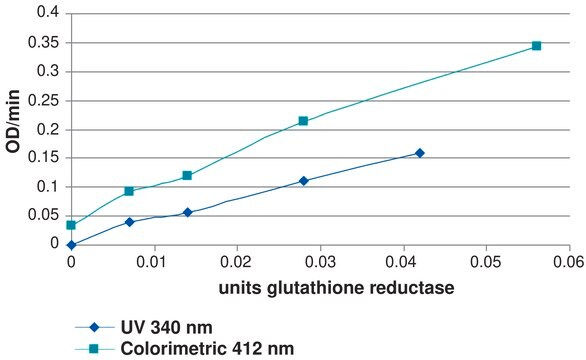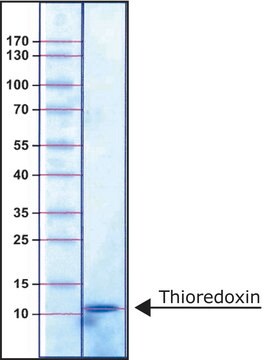G9297
Glutathione Reductase human
buffered aqueous solution, ≥10 units/mg protein, recombinant, expressed in E. coli
Synonym(s):
GR, Glutathione-disulfide reductase, NADPH:oxidized glutathione oxidoreductase
Sign Into View Organizational & Contract Pricing
All Photos(2)
About This Item
CAS Number:
MDL number:
UNSPSC Code:
12352203
NACRES:
NA.41
Recommended Products
General description
Research area: Cell signaling. Glutathione Reductase belongs to the homodimericFAD−disulfide oxidoreductases family. is made up of highly conserved domains such as two Rossmann fold domains, where one binds to reduced nicotinamide adenine dinucleotide phosphate (NADPH) and flavin adenine dinucleotide (FAD) the second one is an interface dimerization domain. It favors its accumulation in the regions of high electron flux in cells where reactive species are generated.
Application
Human glutathione reductase has been used in:
- glutathione reductase activity assay
- oxidative stress analysis
- redox assays
Biochem/physiol Actions
Glutathione reductase enzyme is a homodimeric enzyme containing 1 FAD molecule and 1 NADPH binding domain per subunit. Both human GR (hGR) and Plasmodium falciparum GR (PfGR) are essential for the survival of the malaria parasite within the human erythrocyte. Thus, this enzyme may be used for studies of candidate anti-malaria reagents.
Glutathione reductase is a ubiquitous flavoenzyme involved in the protection from cell stress. Glutathione reductase catalyzes the reduction of oxidized glutathione (GSSG) to glutathione (GSH). It is essential for the glutathione redox cycle that maintains adequate levels of reduced cellular GSH, which serves as an antioxidant reacting with free radicals and organic peroxides. Glutathione is also an electron donor for glutathione peroxidases and a substrate for glutathione S-transferases contributing to the detoxification and elimination of toxic electrophilic metabolites and xenobiotics.
Human glutathione reductase is suitable as cytostatic and antimalarialagent. It may also be used to protect against malaria by mimicking favism by blockingthe enzyme with specific inhibitors.
Unit Definition
1 unit will reduce 1.0 μmole of DTNB to TNB per minute at 25 °C at pH 7.5.
Physical form
Solution containing 25 mM Tris-HCl, pH 7.4, 1 mM EDTA, and 50% (v/v) glycerol.
Disclaimer
Unless otherwise stated in our catalog or other company documentation accompanying the product(s), our products are intended for research use only and are not to be used for any other purpose, which includes but is not limited to, unauthorized commercial uses, in vitro diagnostic uses, ex vivo or in vivo therapeutic uses or any type of consumption or application to humans or animals.
related product
Storage Class Code
10 - Combustible liquids
WGK
WGK 2
Flash Point(F)
Not applicable
Flash Point(C)
Not applicable
Personal Protective Equipment
dust mask type N95 (US), Eyeshields, Gloves
Certificates of Analysis (COA)
Search for Certificates of Analysis (COA) by entering the products Lot/Batch Number. Lot and Batch Numbers can be found on a product’s label following the words ‘Lot’ or ‘Batch’.
Already Own This Product?
Find documentation for the products that you have recently purchased in the Document Library.
Customers Also Viewed
Haitao Shi et al.
Plant physiology and biochemistry : PPB, 71, 226-234 (2013-08-27)
As a gaseous molecule, hydrogen sulfide (H2S) has been recently found to be involved in plant responses to multiple abiotic stress. In this study, salt (150 and 300 mM NaCl), osmotic (15% and 30% PEG6000) and cold (4 °C) stress
Marcela Z Campanini et al.
Journal of photochemistry and photobiology. B, Biology, 127, 153-160 (2013-09-18)
Plants rich in antioxidant substances may be a promising strategy for preventing UV-induced oxidative and inflammatory damage of the skin. Pimenta pseudocaryophyllus is native to Brazil and presents flavonoids and other polyphenolic compounds in high concentration. Thus, the present study
Dietary methionine can sustain cytosolic redox homeostasis in the mouse liver
Sofi Eriksson, et al.
Nature Communications (2014)
C C Bohme et al.
The Journal of biological chemistry, 275(48), 37317-37323 (2000-09-02)
The homodimeric flavoenzyme glutathione reductase (GR) maintains high intracellular concentrations of the antioxidant glutathione (GSSG + NADPH + H(+) <--> 2 GSH + NADP(+)). Due to its central function in cellular redox metabolism, inhibition of GR from the malarial parasite
Walid Abu El-Soud et al.
Plant physiology and biochemistry : PPB, 71, 173-183 (2013-08-14)
Seed germination and growth of seedlings are critical phases of plant life that are adversely affected by various environmental cues. Water availability is one of the main factors that limit the productivity of many crops. This study was conducted to
Our team of scientists has experience in all areas of research including Life Science, Material Science, Chemical Synthesis, Chromatography, Analytical and many others.
Contact Technical Service







